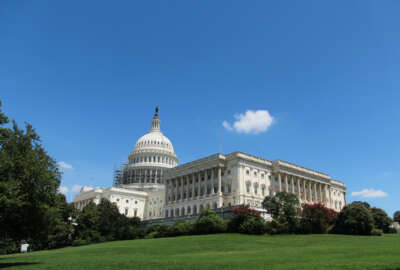

For experienced professionals not seeking to earn a JD and practice law, Maryland Carey Law’s MS in Law program offers a way to complement expansive industry...
 This content is sponsored by the University of Maryland Francis King Carey School of Law.
This content is sponsored by the University of Maryland Francis King Carey School of Law.
Like sea levels, extreme weather is on the rise, as climate change multiplies the number and severity of earthquakes, floods, fires, and hurricanes, from Australia to Puerto Rico. Meanwhile, the federal government is rolling back environmental regulations and working to overhaul the National Environmental Policy Act so that federal agencies will no longer be required to consider climate impacts of major infrastructure projects.
But climate change itself imperils infrastructure, with natural disasters progressively stressing and overwhelming the structural foundations on which the global population depends for the transportation of people, water, and energy.
Scientists, city planners, and engineers must be adaptable leaders. Building and rebuilding for the future requires unprecedented expertise in a regulatory landscape in flux, as infrastructure projects impact and are increasingly impacted by an environment in what famed naturalist Sir David Attenborough recently called a “crisis moment.”
The University of Maryland Francis King Carey School of Law’s MS in Law with a specialization in Environmental Law fulfills that need with a two-year, part-time evening program. Taught at the University of Maryland, College Park, the Environmental Law specialization enables students to delve into such topics as the Clean Water and Clean Air acts, energy policy and climate change, global environmental law, and chemical regulation, graduating with the legal capabilities for nimble problem-solving and thoughtful planning.
Janelle Mummey (MSL ’19) uses her Master of Science in Law degree extensively in her position as legislative liaison for the Baltimore City Department of Public Works. “The program helped me become more confident in reading and understanding documents that I handle in my position every day: statutes, proposed legislation, executive orders, and regulations,” says Mummey. “My understanding of key statutes helps me ensure that DPW is in compliance with environmental legislation, regulations, and policies.”
The program’s capstone project gives students the opportunity to critically analyze the law as applied to real-world challenges. Closely advised by distinguished law school faculty, students are encouraged to investigate environmental legal issues that bear directly on their professional work so they may begin advancing their career interests while in the program.
For her capstone project, Mummey conducted in-depth research on the legal and regulatory framework governing wastewater infrastructure under the Clean Water Act—context that directly informs her work on policy issues related to a consent decree addressing sanitary sewer overflows from Baltimore City’s collection system.
“I regularly work on policy issues related to the consent decree,” says Mummey. “I’m not sure if my capstone was the reason I was hired, but it certainly helped.”
For experienced professionals not seeking to earn a JD and practice law, Maryland Carey Law’s MS in Law program offers a way to complement expansive industry experience with valuable legal knowledge and skills. Find out more about the MS in Law specializing in Environmental Law.
Copyright © 2024 Federal News Network. All rights reserved. This website is not intended for users located within the European Economic Area.


